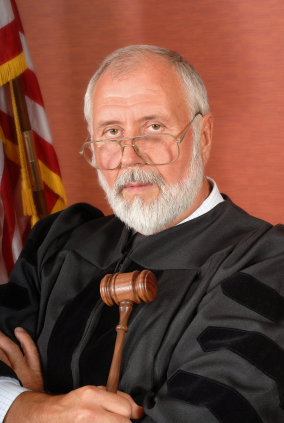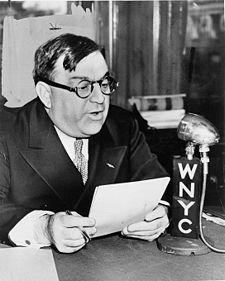A Story of Grace
Is there a line between grace and the law? Does one cancel the other?
It Really Happened Just This Way!
It was the winter of 1935. The nation was in the throes of the great depression. It’s hard for us to imagine in today’s affluent society just how desperate those days were. Those were the days of the soup kitchens. Jobs were hard to come by and money was scarce. There was a man by the name of Fiorello LaGuardia who was the mayor of New York City during those dark days.
LaGuardia seemed to have a genuine heartfelt love for the common man, especially the downtrodden. One time, during a newspaper strike, he spent his Sunday mornings reading the funny papers over the radio, and with all the appropriate inflections. Why? He didn’t want the children of New York to be deprived of that little bit of enjoyment. LaGuardia was well known for his blustery outbursts against the “bums” that exploited the poor. He was completely unpredictable and full of surprises.
The Night Court Events!
One night he showed up at a night court in one of the poorest wards of the city, and that’s where this phase of our story begins. He dismissed the presiding judge for the evening and sent him home to his family. Then the mayor himself took over the bench.
As it happened on that bitterly cold night, a tattered old woman stood before the bench, accused of stealing a loaf of bread. You must understand these were desperate times. A lot of people were going hungry.
With quivering lips and tear filled eyes, she admitted to the theft. “But” she added, “My daughter’s husband has deserted her, she is sick, and her children are crying because they have nothing to eat.”
The shopkeeper, however, refused to drop the charges. “It’s a bad neighborhood your honor, she’s guilty,” he shouted. “The law must be upheld, she’s got to be punished to teach other people a lesson.” LaGuardia knew that her accuser was right. The very office that he swore to uphold required that he enforce the letter of the law.
Law Must Be Upheld!
LaGuardia sighed. He turned to the old woman and said, “I’ve got to punish you; the law makes no exceptions”. He then pronounced the sentence. The old woman shuddered when she heard the words: “Ten dollars or ten days in jail.” But already the judge was reaching into his pocket. He pulled out a ten-dollar bill and threw it into his hat. “Here’s the ten-dollar fine which I now remit. Furthermore, I’m fining everyone in this courtroom fifty cents for living in a town where a person has to steal bread so that her grandchildren can eat. Mr. Bailiff collect the fines and give them to the defendant.”
Sitting in that courtroom that night were about seventy petty criminals, a few New York policemen, and her accuser, a fuming, red faced, storekeeper. The bewildered old grandmother left the courtroom with $47.50. This was enough to buy groceries for several months.
That’s a very good story and it’s a true story, but how is that relevant to us today? Let’s review the event and see what really took place that cold winter evening.
An Analysis Of The Events Of That Evening:
1. Was the storekeeper correct in his accusation? Yes. The old woman was guilty.
2. Was guilt confessed? Yes. She admitted the theft.
3. Did her reason for stealing make any difference to the law? No. The law can make no exceptions.
4. Was the judgment decreed and sentencing pronounced? Yes. The old grandmother was found guilty and sentenced to a fine she could not pay.
5. Was justice carried through, thus satisfying the law? Yes. The fine was paid in full.
6. Was grace extended? Yes. The guilty party walked out of that courtroom completely free and her penalty paid.
7. Did the guilty party do anything at all to deserve or earn the grace received? Not a thing. It was free, and there for her to accept.
8. Was the law done away? No. The law is still intact, and it’s still against the law to steal bread in New York City. The law was neither changed, adjusted, sidestepped nor done-away.
9. Having received grace, is the grandmother now free of the law to go steal again? As Paul would say, “God forbid.”
Could We Therefore Conclude That:
1.The law was fulfilled.
2.Justice was done.
3.Her accuser silenced.
4.Compassion won out over the law, yet the law is still intact.
I think we have no other choice. What about you?
But How Does This Story Relate To Us?
Actually, we started this story in the middle. Have you ever walked into the middle of a movie, and then had to sit through the beginning in order to understand the ending? You see, our story actually began nearly six thousand years ago, in the Garden of Eden, with the fall of man.
Can you see the parallel? Can’t you imagine Satan standing before God’s throne shouting, “GUILTY, GUILTY”? You must enforce the law, there can be no exceptions.” And there is mankind, the weight of guilt to heavy to bear; a penalty to horrible to contemplate.
Does it matter how justifiable the reason for our crime or what excuse we offer? As LaGuardia said, “The law can make no exceptions.” Just as LaGuardia had to uphold the laws of New York City, God had to uphold his heavenly laws.
The Quandary:
Satan had succeeded it seemed, in forcing God to choose between destroying the law or destroying mankind. It was either, or. For God to be true, for God to be righteous, for God to be God. Action had to be taken, otherwise the law is effete and of no effect. The very foundation of the government of God is challenged. For no government can function without law.
What then must be done? It was man that sinned; therefore man must pay. But if man pays then man will be no more. Satan will have accomplished his objective; which was then as it is now, to destroy mankind.
Is There An Answer?
But what if there should come a second Adam? What if another Adam should come who is totally obedient to God, completely sinless, and qualified in every way to pay the death penalty for all who come to Him in humble submission? Could He, would He step into man’s place and die in his stead?
We read of just such a Man in Revelation 5:5 where it tells of the Lion of the tribe of Judah, the Root of David, who has qualified to open the book of life. As a matter of fact, we read of Him from Genesis to Revelation. The scarlet thread of His redeeming blood can be traced throughout the Bible. He is described in Philippians 2:6-8 as being in the form of God, but humbled Himself to the likeness of man. He came to serve, not to be served and was obedient unto death.
Why the Son of God had to become a son of man!
As mentioned, it was man that sinned; therefore man must pay. Just as Adam’s sin sentenced every human to death, so this Man offers eternal life to everyone who believes in Him. And having accepted and believed what God has done through His Son; we then become buried with Him in baptism into his death. Paul tells us in Romans 5 that, “like as Christ was raised up from the dead by the glory of the Father, we also shall be raised in the likeness of His resurrection.”
God’s inspired word tells us in Romans 5:19, “For if by one man’s disobedience many were made sinners, so by the obedience of one shall all be made righteous.” And in I Corinthians 15:22 “For as in Adam all die, even so in Christ, shall all be made alive.” Also in verse 45 “And so it is written. The first Adam was made a living soul and the last Adam was made a quickening spirit.”
The Analyses:
What would our answers be if we asked the same questions about the grace extended to us as we did about the grace extended to the old grandmother? Well, let’s do that and find out.
1. Is our accuser correct in his accusation? Yes. All mankind has sinned.
2. Was guilt confessed? Yes. We have confessed our sins before God.
3. Did our reason for sinning make any difference to the law? No. The law can make no exceptions.
4. Was judgment decreed and sentencing pronounced? Yes. All mankind was found guilty and sentenced to a penalty it could not pay.
5. Was justice carried out, thus satisfying the law? Yes. The death decree was accomplished.
6. Was grace extended? Yes. The guilty party rose up from the waters of baptism completely free and our penalty paid in full.
7. Did the guilty party do anything at all to deserve or earn the grace received? Not a thing; It was free, and there for us to accept.
8. Was the law done away? No. The law is still intact; and it’s still against the law to disobey God.
The Beauty Of Grace:
The law was not destroyed, and not one jot or tittle was changed, adjusted, eliminated, or passed from the law. That includes the Ten Commandments. Review Mathew 5:17-48 if you have any doubt. (Fulfill does not mean do away).
9. Having received grace, are we now free from the law to continue in sin? As Paul said in Romans 3:31, “---God forbid; yea we establish the law.”
Also Romans 6:15-16 tells us, “What then? Shall we sin, because we are not under the law, but under grace? God forbid. 16 Know ye not, that to whom ye yield yourselves servants to obey, his servants ye are to whom ye obey; whether of sin unto death, or of obedience unto righteousness?”
But haven’t we been told, maybe even read that the law was nailed to the cross? Does it really say that? Well let’s go to the source and see. We read in Colossian 2:14; “having canceled out the certificate of debt consisting of decrees against us, which was hostile to us; and He has taken it out of the way, having nailed it to the cross.” NASU.
What Is A Certificate Of Debt?
The law is not a certificate of debt. It is never referred to in those terms. A certificate of debt is like an I.O.U. or a mortgage; a note that has to be paid. It was our decree of guilt, not the law that was nailed to the cross. The Man who was nailed to the cross paid the penalty that was decreed to us. If the law could have been done away, why would it be necessary for Jesus to die?
You see it’s not really an either or question as Satan thought. It was not necessary to destroy mankind, and grace does not destroy or replace the law.
But What Happened To God’s Law?
Paul tells us in Hebrews 8:10, “For this is the covenant that I will make with the house of Israel after those days, saith the Lord; I will put my laws into their mind, and write them in their hearts: and I will be to them a God, and they shall be to me a people.”
Paul is quoting Jeremiah. These are the same laws God gave Israel. By putting them in our mind God has opened up our understanding of them. By writing them in our heart, our heart’s desire will be to obey them. In Romans 6:17 Paul tells us that we obey from the heart. If God’s laws are not in your heart, you will find many logical sounding reasons not to obey them, just as Eve did.
The Conclusion
10. Could we therefore conclude, that:
1. The law was fulfilled.
2. Justice was done.
3. Our accuser was silenced.
4. Compassion (grace) won out over the law; yet the law is still intact, and always will be.
I think we have no other choice but to say yes to all of the above. What about you?
Isaiah, speaking of Christ, writes, “He will magnify the law and make it honorable (Isaiah 42:21). Magnify does not mean do away.
Certainly our salvation is secure by belief in Jesus Christ, but don’t fool yourself, belief is proven by performance (Rom 6:16; James 2:17). &
Del Leger, (970) 249-6857, Pastor, Christian Church Of God, Grand Junction, Co. dlleger@montrose.net.
“I am come that they might have life, and that they might have it more abundantly.
I am the good shepherd: the good shepherd giveth his life for the sheep.”
John 10:10-11



